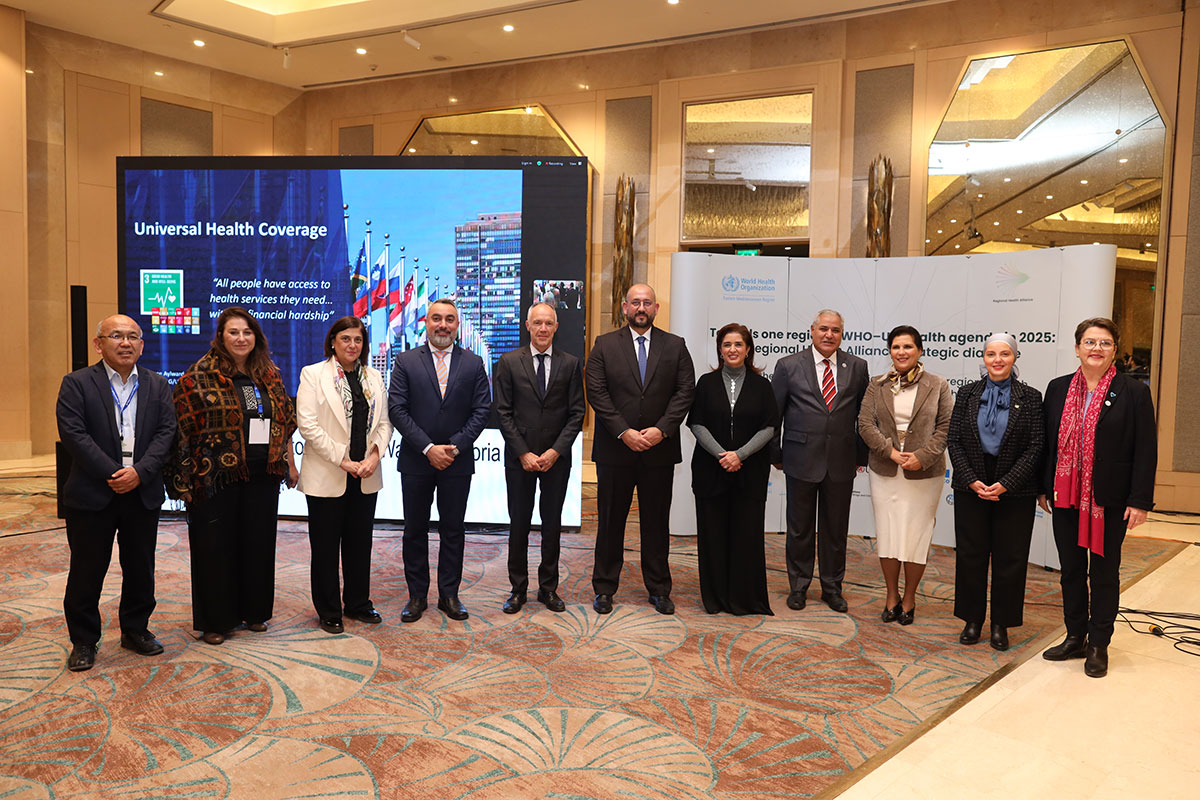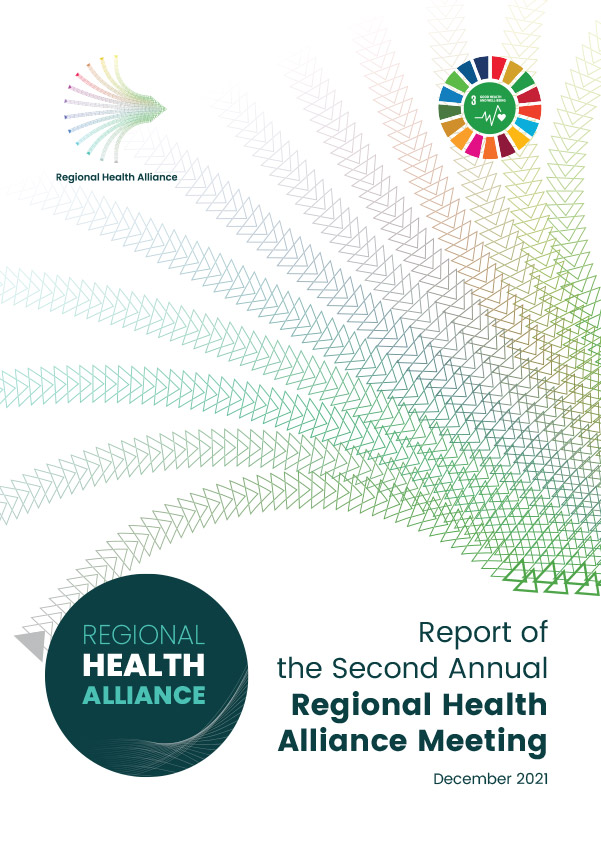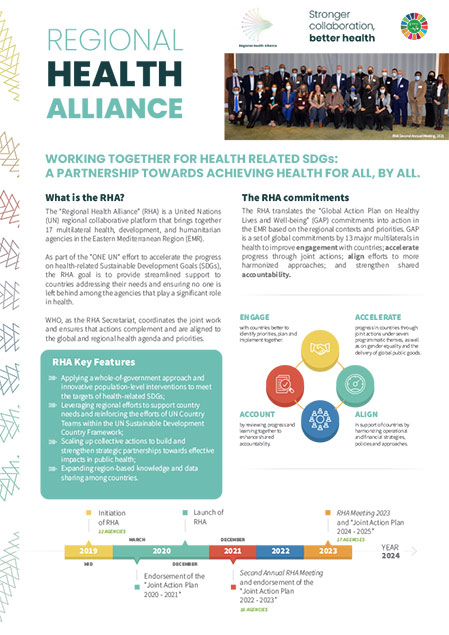Introduction
 The Regional Health Alliance (RHA) comprises multilateral health, development and humanitarian agencies which collaborate to accelerate progress towards the health-related Sustainable Development Goals (SDGs) in the Eastern Mediterranean Region.
The Regional Health Alliance (RHA) comprises multilateral health, development and humanitarian agencies which collaborate to accelerate progress towards the health-related Sustainable Development Goals (SDGs) in the Eastern Mediterranean Region.
By facilitating multilateral engagement and joint efforts to address health priorities, RHA supports Member States meet their goals and ensure that no one is left behind. Led by WHO, it acts as a platform for coordinating the work of UN agency members, optimizing support for Member States as they advance their health-focused development strategies and plans, particularly those aligned with the health-related SDGs.
Established in mid-2019 with 12 UN agency members, the alliance has grown to include 18 member organizations, including the Food and Agriculture Organization (FAO), the International Organization for Migration (IOM), the International Telecommunication Union (ITU), the United Nations Office for the Coordination of Humanitarian Affairs (OCHA), the Joint United Nations Programme on HIV/AIDS (UNAIDS), the United Nations Development Programme (UNDP), the United Nations Educational, Scientific and Cultural Organization (UNESCO), the United Nations Population Fund (UNFPA), UN-Habitat, the UN Refugee Agency (UNHCR), the United Nations Children's Fund (UNICEF), the United Nations Industrial Development Organization (UNIDO), the United Nations Office on Drugs and Crime (UNODC), the United Nations Relief and Works Agency for Palestine Refugees in the Near East (UNRWA), UN Women and the World Food Programme (WFP).
On 5 March 2020, the first Regional Health Forum convened and a joint action plan for 2020–2021 was launched. RHA’s joint action plans detail collectively identified actions and set clear deliverables. Participants also committed to regular meetings to share information, track progress and undertake missions to priority countries.
In December 2021, RHA members, under the leadership of the WHO Regional Director, endorsed a second joint action plan, covering 2022–2023. The meeting included the presentation of case studies illustrating both achievements and challenges in advancing towards the health-related SDGs.
The objectives of the RHA include:
Foster collaboration on priority public health issues across UN development and humanitarian system entities operating at the regional and sub-regional levels.
Promote joint actions to address gaps in health-related SDGs implementation, including those identified through the RHA evaluation process.
Discuss major regional strategic public health developments and issues, pathways to addressing them, and align regional and global health agendas accordingly.
Promote and support regional and sub-regional collaboration, initiatives and programmes, and transboundary and common health issues.
Promote coherent regional policy dialogues and advocacy strategies.
Facilitate demand-driven normative and policy support coupled with the technical capacity to integrate health in the UNSDCFs.
Related link
Working together for health-related SDGs: a partnership towards achieving health for all, by all.

Joint workplan
Highlights
RHA meets to accelerate action on polio eradication and maternal, newborn and child health
17 July 2025, Cairo, Egypt – The Regional Health Alliance (RHA) convenes today to accelerate efforts to improve maternal, newborn and child health and support immunization and polio eradication across the World Health Organization (WHO) Eastern Mediterranean Region.
The meeting will gather representatives from nine UN agencies and six priority countries – Afghanistan, Djibouti, Pakistan, Somalia, Sudan and Yemen.
Hosted by WHO Regional Office for the Eastern Mediterranean, the one-day meeting aims to strengthen support for Member States as they implement national strategies to reduce maternal, newborn and child mortality, eradicate polio and boost immunization coverage through the Expanded Programme on Immunization.
Recent data indicate that 60 countries globally are not on track to meet the Sustainable Development Goal (SDG) targets on under-5 mortality, and 65 are off track for the neonatal mortality target. In 2023, the six priority countries accounted for almost 85% of under-5 deaths (694 000 out of 812 000) in the Eastern Mediterranean Region and recorded some of the highest maternal mortality rates globally, ranging from 155 to 563 per 100 000 live births.
UN partners unite for a healthier Eastern Mediterranean

15 January 2025, Cairo, Egypt – The Regional Health Alliance (RHA) Strategic Dialogue, Towards One Regional WHO-UN Health Agenda in 2025, convened 86 in-person and 11 virtual attendees, including the technical focal points and regional directors of the 18 participating UN agencies.
Attendees from the 3 levels of WHO included assistant directors general from WHO headquarters, senior management, including directors of departments, and regional advisors and technical officers from the WHO Regional Office for the Eastern Mediterranean, and representatives from WHO country offices providing critical field insights. Outcomes included the endorsement of a new RHA structure and Joint Action Plan (JAP) 2025 and the introduction of the 3 regional flagship initiatives.
Regional Health Alliance strategic dialogue: towards a unified regional WHO–UN health agenda in 2025

On 15 January 2025, the World Health Organization (WHO) Regional Office for the Eastern Mediterranean, under the leadership of Regional Director Dr Hanan Balkhy, will host a landmark meeting of the Regional Health Alliance (RHA) at the Waldorf Astoria hotel in Cairo, Egypt.
Bringing together over 80 participants from the 18 UN organizations in the Alliance, the high-level gathering marks a pivotal step in WHO’s efforts to foster a unified UN health agenda for the Region.
Director of Programme Management Dr Adham Abdel Moneim, acting Regional Emergency Director Dr Ahmed Zouiten, Assistant Director-General for Universal Health Coverage and Life Course Dr Bruce Aylward and Assistant Director-General for Access to Medicines and Health Products Dr Yukiko Nakatani will be among the attendees.
Invitees to the meeting include regional directors and technical officers from FAO, IOM, ITU, OCHA, the World Bank, UNAIDS, UNDP, UNESCO, UNFPA, UN-Habitat, UNHCR, UNICEF, UNIDO, UNODC, UNRWA, UN Women and WFP.













